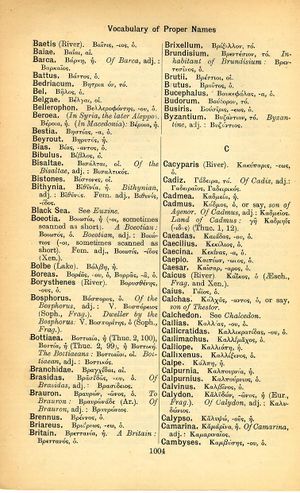Calpe
οἱ Κυρηναϊκοὶ δόξαις ἐχρῶντο τοιαύταις: δύο πάθη ὑφίσταντο, πόνον καὶ ἡδονήν, τὴν μὲν λείαν κίνησιν, τὴν ἡδονήν, τὸν δὲ πόνον τραχεῖαν κίνησιν → the Cyrenaics admitted two sensations, pain and pleasure, the one consisting in a smooth motion, pleasure, the other a rough motion, pain
English > Greek (Woodhouse)
Κάλπη, ἡ.
Latin > English (Lewis & Short)
Calpē: ēs, f., = Κάλπη,
I one of the pillars of Hercules in Hispania Baetica, now Rock of Gibraltar, Mel. 1, 5, 3; 2, 6, 8; Plin. 3, prooem. § 4; 3, 1, 3, § 7; Asin. ap. Cic. Fam. 10, 32, 1: Ibera, Sen. Herc. Oet. 1254; Luc. 1, 555; 4, 71 (abl. scanned Calpĕ, Juv. 14, 279).—
II Derivv.
A Calpētā-nus, a, um, adj., of Calpe: gurges, Avien. Progn. 1620.—
B Calpētĭtānus, a, um, adj., of Calpe: vada, Avien. Arat. 1023.
Latin > French (Gaffiot 2016)
Calpē,¹⁴ ēs, f. (Κάλπη), montagne de Bétique (auj. Gibraltar) : Pollio d. Cic. Fam. 10, 32, 1 ; Mela 1, 27 || Calpis, is, f., Sid. Ep. 8, 12, 2 ; abl. ĕ Juv. 14, 279.
Latin > German (Georges)
Calpē, ēs, f. (Κάλπη), hoher Berg an der gaditanischen Meerenge, der mit dem an der afrikan. Küste liegenden Vorgebirge Abyla die sogen. Säulen des Herkules bildet, j. Gibraltar, Asin. Poll. in Cic. ep. 10, 32, 1. Lucan. 1, 555; 4, 71: C. Hibera, Sen. Herc. Oet. 1257 (1253): Abl. unregelm. Calpĕ gemessen bei Iuven. 14, 279 (vgl. Prisc. 7, 8). – Dav. Calpētānus, a, um, kalpetanisch, Avien. progn. 296 (1621) u. Arat. 1024.

